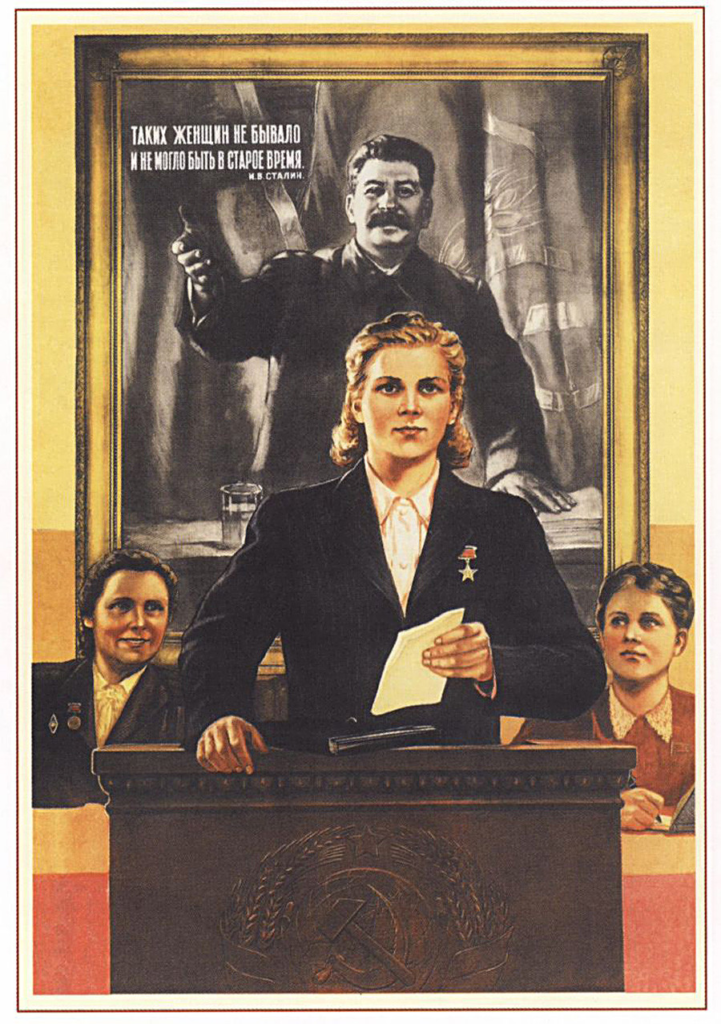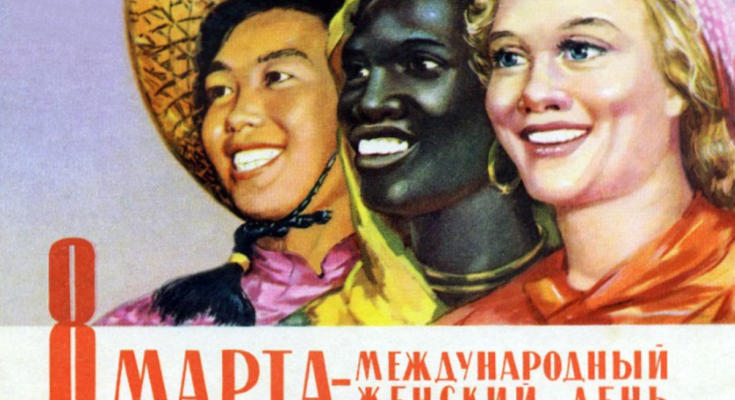We will never achieve gender equality, not unless we bring radical change but modern feminism has strayed completely away from that path. The feminist movement has been completely hijacked by capitalism and has been turned into another one of its pawns which won’t say anything against it despite the fact that the only way we can dismantle the patriarchy and achieve gender equality is by the abolition of capitalism. This is not just a politically charged theory, it has been proven time and time again. The only way gender equality or at least the closest thing to it has been achieved is through marxism. So on this IWD, we must look into the past where we were the closest to achieving feminism.
The feminist and women’s liberation movements have been the most prominent movements in the past centuries and their struggle for equality is continuing to this day but everything that they’re fighting for had already been achieved a century ago.
Core topics like women’s suffrage, right to abortion, equal wages, ability to fight against harassment, affirmative action were attained in the starting years of the first socialist experiment: The USSR.
The Soviet Union was the country where feminism won, feminists fought alongside the bolsheviks in the frontlines of revolution as equals. Many feminist figures like Alexandra Kollontai rose from the revolution and they had significant political power over the new socialist state. Alexandra Kollontai was the first female government minister to be there in her own right rather than as a member of a family made powerful by its male figures. Although she would later have to end her political involvement because of disagreements in the party. Alongside another feminist revolutionary- Inessa Armand, she established the Zhenotdel which was the women’s department of the central committee of the Bolshevik party. It was devoted to improving the conditions of women’s lives throughout the Soviet Union: fighting illiteracy, child marriage, etc. The Zhendotdel had significant influence over the Bolshevik party and successfully legalized abortion in 1920 while also making it free which made the USSR the first country to ever legalize abortion.

The Zhenotdel also spearheaded efforts to bring about a cultural revolution which sought to combat the patriarchy and liberate women through education and employment. They fought against the regressive religious practices in central asia through the aforementioned methods as well as ‘de-veiling’ campaigns. The USSR also isolated the institution of marriage from the orthodox church which allowed free divorces and general liberation from regressive practices linked to the church.
The communist ideology sought out communalising things like childcare to allow women to work without worrying about their families. Community childcare was completely free and was located in most ‘microdistricts’ in the cities. Seniorcare was also widely available.
Collectivization and the abolition of private property eradicated the wage gap between men and women because everyone was guaranteed the right to fair payment and women trade unions made sure that this was executed properly by conducting strikes in any factory where discrimination or harassment against women occurred. Generous maternal and paternal leaves were also legally required.
Women empowerment was heavily emphasized in the USSR, they were one of the first countries to criminalise marital rape and grant women the right to suffrage. Women held very advanced jobs and degrees but were still yet to achieve equality in core political institutions. Perhaps this could’ve been achieved if the experiment lasted longer but there was still affirmative action in other fields such as the judiciary. To this day, there are more female than male judges in the Russian Federation. This number has begun to shrink now but it was moving steadily till the illegal dissolution of the Soviet Union.
International Women’s Day is also linked to socialism. It was a proletarian holiday at first but soon became a symbol for women’s liberation. Alexandra Kollantai then turned it into a national holiday in 1917 with the rest of the communist block following suit .The west didn’t have IWD till 1975, they only had mother’s day which proves to show the stances of both societies on women. It was a day to recognise that women have a special role in building socialism and are also workers like the men.
There was a huge cultural difference between the Soviet Union and its capitalist competitors. Propaganda and advertisements portray the society and its interests the best so we can figure out each system’s portrayal of women by just looking at some of the posters of the time.

The People’s Republic of China has also been very successful in achieving equality. They made several legislations in 1950 which outlawed prostitution, child betrothal and arranged marriages. Free marriage and divorce were also heavily advocated by the government.
This was feminism under socialism but what if it was taken a step further? There has been an experiment in Israel called the Kibbutz. Kibbutz are intentional communities that are built on a combination of communism and utopian socialism. There was no ‘state’, wages or private property. People worked according to their capacity and earned according to their needs. These kibbutz put a very strong emphasis on gender equality which led to new ideas like the abolition of gender norms and the typical family unit being implemented.
Women did manual labour, worked in the fields, acted as armed guards for the farm etc. They did jobs that are typically considered to be for men while men were nurses, chefs, housewives etc. Abolition of the typical family unit meant ending the ‘normal’ patriarchal family unit where the woman was financially and socially dependent on her husband who had absolute authority over the household would effectively put an end to the patriarchy to a high extent. There was also community childcare that resembled hostels, children would sleep, study, eat and do everything together till a certain age and get a few hours a day to spend time with their parents. This had 2 benefits: Girls and boys would be raised together and alike wearing gender neutral clothes and playing with gender neutral toys which would eliminate gender stereotyping as a whole. Since the mother no longer had the full responsibility of raising her child, she’d be able to pursue her career and not worry about a ‘second shift’ at home.
These experiments have ultimately come to an end now because of several factors like the spread of neoliberalism, corporate interests and change of regime in the whole of Israel. Regardless, this experiment was highly successful and completely changed the social order of the kibbutz communities. The decline of this experiment reaches the debate of utopian and scientific socialism but that is not relevant here.
To look at a very recent example, Cuba has officially legislated the most progressive family code in the entire world. Not only has it legalized LGBTQIA marriage and adoption, it has also redefined the family unit from previously just including a heterosexual couple with kids to one that values love, affection, solidarity and responsibility. A family in Cuba can just be 10 dads with no child or it could be just 3 platonic friends. This new family code is also a huge step in dismantling the patriarchy and the rest of the world hasn’t even gotten close to it. This code was also voted in by the people of Cuba through a democratic referendum which completely goes against the western claim that Cuba is an authoritarian hellhole where the people have no power. I mean, when was the last time you directly voted for a bill?
To put into perspective, the “most progressive nation on earth”: the US, removed abortion from the list of human rights which subsequently made several states criminalize abortion when the USSR made it legal and free a century ago.
Feminism in India has been turned into a very classist movement which only wants liberties for an elite few while the rest still suffer. This type of bourgeois feminism does not stand for gender equality, it does not want to free women from their chains; It only stands for privileges for themselves and will actively oppose real feminism to protect them.
To conclude, socialism has liberated hundreds of millions of women from the misogynistic systems they lived under and has given them opportunities for education, employment and financial independence. This is the only way we can achieve gender equality.
Happy International Women’s Day!





